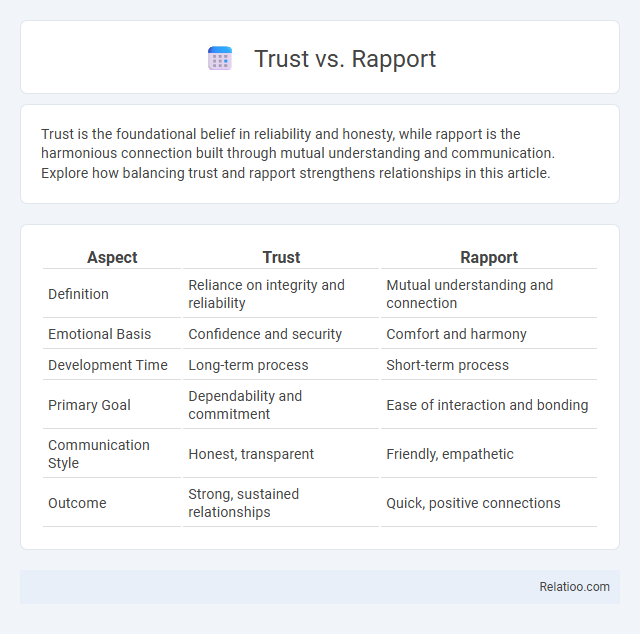Trust is the foundational belief in reliability and honesty, while rapport is the harmonious connection built through mutual understanding and communication. Explore how balancing trust and rapport strengthens relationships in this article.
Table of Comparison
| Aspect | Trust | Rapport |
|---|---|---|
| Definition | Reliance on integrity and reliability | Mutual understanding and connection |
| Emotional Basis | Confidence and security | Comfort and harmony |
| Development Time | Long-term process | Short-term process |
| Primary Goal | Dependability and commitment | Ease of interaction and bonding |
| Communication Style | Honest, transparent | Friendly, empathetic |
| Outcome | Strong, sustained relationships | Quick, positive connections |
Understanding Trust and Rapport
Trust is the confident reliance on the integrity, ability, or character of a person or entity, forming the foundation for meaningful relationships. Rapport is the harmonious connection or mutual understanding between individuals that facilitates open communication and emotional bonding. Understanding the distinction between trust and rapport is crucial: trust often develops over time through consistent actions, while rapport can be established quickly through empathy and active listening.
Defining Trust in Relationships
Trust in relationships is the firm belief in the reliability, honesty, and integrity of another person, forming the foundation for deeper connections. Unlike rapport, which relates to mutual understanding and ease of communication, trust encompasses a long-term confidence that your partner will act in your best interest. Establishing trust requires consistent actions, transparency, and vulnerability, ensuring that your relationship can withstand challenges and grow stronger over time.
What is Rapport?
Rapport is the harmonious connection established between individuals through mutual understanding, empathy, and effective communication, fostering a sense of trust and cooperation. Building rapport involves recognizing and respecting Your counterpart's feelings and perspectives, which creates a foundation for deeper trust and collaboration. Unlike trust, which develops over time based on reliability and consistency, rapport is often formed quickly through social cues and shared experiences.
Key Differences Between Trust and Rapport
Trust involves confidence in someone's reliability and integrity based on past behavior, while rapport refers to a harmonious connection built through mutual understanding and communication. Your ability to establish rapport is crucial for creating a foundation, but trust requires consistent demonstration of credibility and dependability over time. Recognizing these key differences helps improve personal and professional relationships by addressing both emotional connection and assurance in actions.
Building Trust: Essential Factors
Building trust requires consistent honesty, transparency, and reliability, fostering a foundation where individuals feel safe and valued. Rapport enhances trust by creating emotional connections and mutual understanding, achieved through active listening and empathy. Trust solidifies relationships by ensuring dependability and integrity, which are vital for long-term collaboration and effective communication.
Establishing Rapport: Practical Techniques
Establishing rapport involves active listening, mirroring body language, and demonstrating empathy to create a genuine connection and build trust. Using open-ended questions encourages deeper conversation and fosters mutual understanding. Consistent positive feedback and maintaining eye contact enhance comfort and strengthen interpersonal bonds essential for trust development.
The Role of Communication in Trust and Rapport
Effective communication is fundamental in building both trust and rapport, as it enables clarity, transparency, and emotional connection between parties. Trust develops through consistent and honest exchanges, while rapport emerges from empathetic and engaging interactions that foster mutual understanding. Mastering verbal and nonverbal communication skills enhances the ability to establish lasting trust and strong rapport in personal and professional relationships.
Trust vs Rapport in Professional Settings
In professional settings, trust forms the foundation for reliable and consistent interactions, while rapport focuses on creating a positive emotional connection between colleagues. Trust is built through demonstrated competence, integrity, and accountability, which ensures confidence in others' actions and decisions. Rapport enhances communication and collaboration by fostering mutual understanding and empathy but does not inherently guarantee the dependability that trust provides.
How to Nurture Both in Long-Term Relationships
Building trust and rapport in long-term relationships requires consistent transparency, active listening, and genuine empathy to create a foundation of reliability and emotional connection. You can nurture both by setting clear expectations, following through on commitments, and engaging in open communication that fosters mutual respect and understanding. Regularly expressing appreciation and addressing conflicts promptly helps sustain trust while deepening the rapport necessary for enduring partnerships.
Common Misconceptions About Trust and Rapport
Common misconceptions about trust and rapport often blur the distinction between these concepts, leading to confusion in relationship-building strategies. Trust is a foundational belief in reliability and integrity, while rapport refers to the harmonious connection built through mutual understanding and communication. Your ability to recognize that rapport fosters initial connection but does not guarantee trust is crucial for developing deeper, long-lasting relationships.

Infographic: Trust vs Rapport
 relatioo.com
relatioo.com